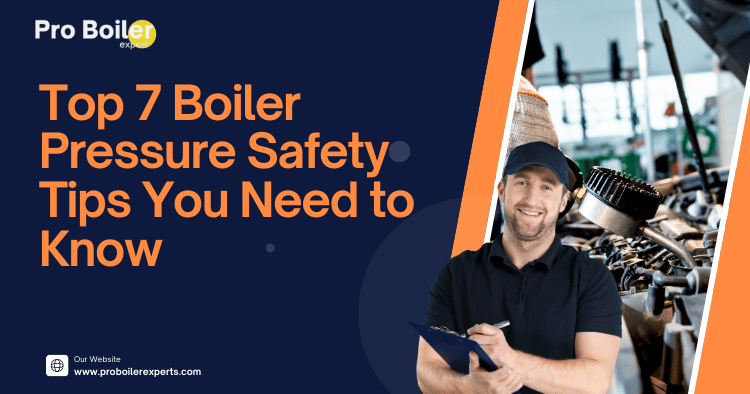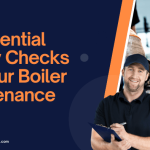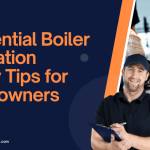Table of Contents
- Understanding Boiler Pressure
- Regular Maintenance Checks
- Know Your Pressure Relief Valve
- Monitor Pressure Levels
- Use Quality Boiler Controls
- Implement Safety Protocols
- Seek Professional Help When Needed
Boilers are essential for heating systems in homes and industries, but they come with their own set of safety concerns, particularly regarding pressure. Proper boiler pressure management is crucial for safety and efficiency. Below, we delve into the top seven boiler pressure safety tips you need to know to keep your system functioning correctly and safely.
Understanding Boiler Pressure
Boiler pressure refers to the force exerted by the steam or water within the boiler. The pressure is typically measured in pounds per square inch (PSI). Understanding the normal operating pressure for your specific boiler type is crucial. For most residential boilers, the ideal pressure is usually between 12 to 15 PSI when the system is cold and can rise to about 20 PSI when heated.
Why It Matters:
- High pressure can lead to dangerous situations, including boiler failure or explosions.
- Low pressure can result in insufficient heating and inefficient operation.
For an in-depth look at boiler pressure, refer to this guide from the American Society of Mechanical Engineers.
Regular Maintenance Checks
Routine maintenance is the backbone of boiler safety. Regular checks can help identify potential issues before they escalate.
What to Check:
- Inspect the pressure gauge to ensure it’s functioning accurately.
- Look for leaks or signs of corrosion.
- Clean the boiler and remove any buildup that could interfere with its operation.
Maintenance Schedule:
| Frequency | Task |
|---|---|
| Monthly | Check pressure gauge and safety valve |
| Quarterly | Inspect for leaks and corrosion |
| Annually | Professional service and inspection |
Always refer to your boiler’s manual for specific maintenance recommendations. Regular professional inspections can help keep your boiler safe and efficient. For expert insights, you might also check top tips for effective boiler maintenance.
Know Your Pressure Relief Valve
The pressure relief valve is a critical safety feature of your boiler. It is designed to release excess pressure, preventing the boiler from reaching dangerous levels.
Key Points:
- Test the valve periodically to ensure it opens and closes properly.
- If you notice water leaking from the valve, it may need to be replaced.
- Understand the pressure settings; the valve should open before reaching the maximum safe pressure for your boiler.
For more detailed information about pressure relief valves, check out the U.S. Consumer Product Safety Commission.
Monitor Pressure Levels
Keeping an eye on the pressure levels is essential for safe operation. Most modern boilers come equipped with pressure gauges.
Tips for Monitoring:
- Regularly check the pressure gauge and look for fluctuations.
- If you see the pressure rising above normal levels (usually above 30 PSI), take action immediately.
- Use a digital gauge for more accurate readings, if available.
If you notice consistent overpressure, it may indicate a malfunction. It’s best to consult a professional to diagnose and rectify the issue. You can find more on monitoring and troubleshooting in this article on common boiler issues.
Use Quality Boiler Controls
Quality boiler controls are vital for maintaining safe pressure levels. They help regulate the temperature and pressure within the boiler.
Recommendations:
- Invest in high-quality control systems with features such as automatic shut-off and alarms.
- Ensure that the controls are compatible with your boiler type.
- Regularly update software if your system has digital controls.
Quality controls not only enhance safety but also improve the overall efficiency of your boiler. To optimize your system’s efficiency, consider reading about smart boiler options.
Implement Safety Protocols
Establishing safety protocols for boiler operation can significantly reduce risks associated with high-pressure situations.
Safety Protocols to Consider:
- Train personnel on operating procedures and safety measures.
- Develop an emergency response plan in case of pressure-related incidents.
- Keep emergency contact numbers readily available.
By fostering a culture of safety, you can help prevent accidents and ensure that everyone involved understands the importance of boiler pressure management. For more safety tips, check out boiler safety guidelines.
Seek Professional Help When Needed
When it comes to boiler pressure issues, it’s always best to seek professional assistance. DIY fixes can often lead to more significant problems, especially if you lack the necessary expertise.
When to Call a Professional:
- Sudden changes in pressure readings.
- Unusual noises or leaks from the boiler.
- Persistent warning lights or alerts on your control panel.
Professional inspections not only resolve current issues but can also prevent future complications, ensuring your boiler remains safe and efficient. For more on finding the right boiler experts, you can visit this resource.
By following these top seven boiler pressure safety tips, you can help ensure the safe and efficient operation of your heating system. Regular maintenance, timely monitoring, and professional assistance are keys to preventing accidents and extending the lifespan of your boiler. For more information on boiler safety, consider checking resources such as the Boiler Safety Association.
Stay safe and keep warm!





